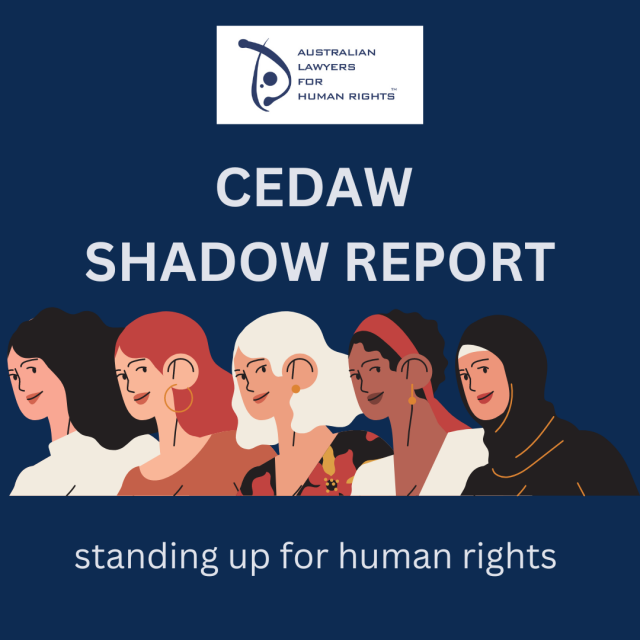ALHR CEDAW Shadow Report

In January 2023 ALHR submitted a Shadow Report to the United Nations Committee Committee on the Elimination of Discrimination Against Women regarding aspects of Australia’s compliance with the the Convention on the Elimination of All Forms of Discrimination Against Women (CEDAW).
Since the last reporting cycle, Australia has taken a number of positive steps to implement its obligations under CEDAW but significant gaps in implementation remain.
The Commonwealth has not implemented the Committee’s longstanding recommendation with respect to the enactment of a federal charter of human rights. There remains no federal guarantee of equality between men and women or general prohibition on discrimination against women.
Gender stereotyping continues to pervade Australian society, and discriminatory stereotypes have a disproportionate impact on women and girls, but also, with even more pervasiveness, women who experience intersecting forms of discrimination, including Aboriginal and Torres Strait Islander women, lesbian and transgender women, refugees and migrant women, and women with a disability. Australia is yet to develop a comprehensive strategy to overcome discriminatory gender-based stereotypes.
Gender inequality persists in employment, with a national gender pay gap of 14.1%; a gap wider still for women who experience intersectional disadvantage, including women from migrant or refugee backgrounds and Aboriginal and Torres Strait Islander women. Women bear a disproportionate share of unpaid work and men’s superannuation balances on retirement are on average twice as large as women’s. Women aged 55 and over are at higher risk of poverty and represent the fastest growing group experiencing homelessness in Australia.
On 15 March 2021, tens of thousands of Australians marched across the nation to demand an end to gender-based violence, harassment and discrimination. The protests followed the reporting of a number of allegations of sexual assault, including accounts of sexual violence perpetrated against schoolgirls, and concomitant disbelief, dehumanisation and victim-blaming faced by accusers. The demonstrations were a manifestation of pent-up frustration over entrenched gender inequality, stereotyping and the failure to address gender-based violence and discrimination. While the protest organisers’ demands for full investigations into all allegations of gendered violence and a federal Gender Equality Act were not met, their demands for workplace sexual harassment legislation have been realised and will mark an important step in Australia’s implementation of CEDAW. This legislation will be considered below, followed by a discussion of four key areas of concern, namely violence against women, the detention of women and girls, the realisation of reproductive health and the intersecting forms of discrimination experienced by some women, including Aboriginal and Torres Strait Islander women and girls.
Read ALHR’s shadow report in full here
Contact us here if you would like to join ALHR’s Women and Girls’ Rights Committee



